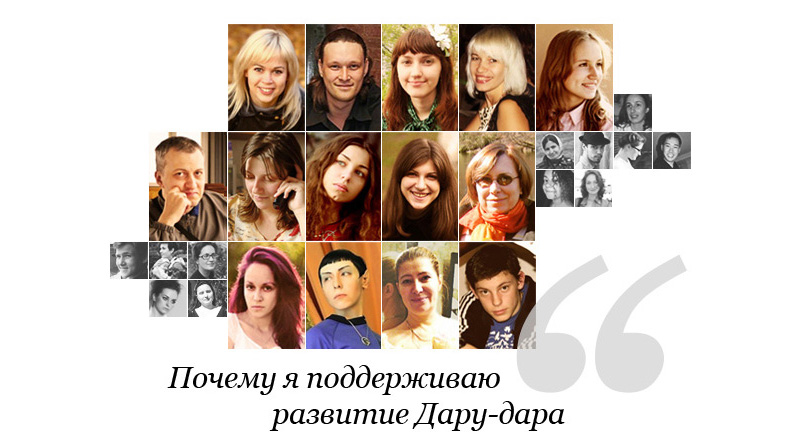Becker? Donor? Sponsor? Benefactor? Maecenas
 Recently, I had the opportunity to address the topic “Why give money” in the club “Merit Economics”. Our current campaign of public funding of Daru-dara asks us many questions, and I tried to answer some of them in my speech.
Recently, I had the opportunity to address the topic “Why give money” in the club “Merit Economics”. Our current campaign of public funding of Daru-dara asks us many questions, and I tried to answer some of them in my speech. First of all, I tried to figure out what “crowdfunding" is, which emerged as a concept recently and whose appearance symbolizes a new way of people’s attitude to each other and to the world around them. How does this new way of giving money relate to existing methods such as sponsorship, charity, and philanthropy?
In this article, I briefly summarize my presentation. I do not pretend to be an exhaustive story, but I hope this publication will be interesting and useful to everyone who is trying to engage in crowdfunding in the Russian-speaking space.
And from the picture on the right, you can go to the video in which we on Arbat sing a popular song with an accordion - in support of the Gift (=
About the importance of Russian words
In our campaign for public financing of the Gift of Dar, the most striking question, perhaps, should be recognized as follows: “Why help the Internet project, if he himself must be able to earn? Isn't it better to help those who cannot earn money in principle? ”The reason for such questions is a widespread misunderstanding of who and why we can give money to, in what circumstances it makes sense and what consequences it can lead to.
In order for any social practice to find life, it is necessary to give it a name, fill it with a meaning that everyone would understand. It is no secret that most of the new meanings are now emerging in the English-speaking environment, and there they find their names. Borrowed English words are poorly translated. They are quickly absorbed by those who constantly rotate in an English-speaking environment, but then spread very slowly - including among those who speak English but do not use it in their daily lives. If we are talking about the formation of social practices, we assume precisely the wide and rapid spread of the new word.
Therefore, it is very important to be able to translate English concepts and agree on the joint use of these new words. Or, if the literal translation does not work out, you need to look for suitable words that convey a similar meaning. And only in extreme cases, resort to letter-by-letter translation. Indeed, behind every word known to everyone there is a whole series of associations, references to other important meanings. This is a huge energy accumulated by the language over many generations of native speakers. And it’s a sin not to use this energy, introducing into everyday life a word that no one previously knew at all.
Public finance
So, crowdfunding. It doesn’t sound at all in Russian. And the maximum with which it has an association is with another dissonant word “crowdsourcing”. Why not translate it simply: “public finance”? Yes, we still have shyness from the word “popular”, which is directly related to our collective inferiority complex in relation to the failed dream of the Soviet Union, socialism and communism. But it is time to free ourselves from this complex, to recognize our collective experience as an awesome social experiment, which no other people have had! And why do the inhabitants of the USA almost call each of their projects, which aspire to global distribution, nothing more than a “national project”, and we cannot afford this? “Public finance” sounds convincing and romantic. It means "financial support for a wide variety of people." Much cooler than support from the state or support from the organization! It is so?
People's patron
And what should be called those who become participants in public funding, give their money to the project? In English, they are called “backers” (on Kickstarter) or “donors” (on Wikipedia). The first word means nothing to us at all, the second has a direct association with organ donation, also somehow off topic. What to call?
In other words, “public funding” can be called “public sponsorship”. Accordingly, the person who gives the project money can be called a “folk patron” or simply a “patron”. This is a very good and forgotten word today, which gives us the opportunity to give it a new modern sound. Patronage has a rich and noble history in Russia. The ancestors of most famous patrons came from the common people. The projects that they supported financially were often incomprehensible to contemporaries. And this support has always been directly related to the ethics and personal strong passion of the philanthropist.
If earlier patrons could have been basically wealthy people who single-handedly support a particular project, then in the era of the ubiquitous Internet, uniting and linking together billions of people, such a practice makes sense for everyone. Because we understand that our personal, very small contribution connects with thousands and millions of other similar contributions and thus drives a big common cause.
Sponsor? Benefactor? Maecenas!
So why is it still a "patron" and not a "philanthropist" or not a "sponsor"? It is time, finally, to distinguish between these words. In my misunderstanding of this difference lies, in my opinion, one of the biggest problems on the path of Russian crowdfunding, i.e., public patronage. I found at one time a very simple and memorable description of how it all differs from one another.
Imagine a poor artist. So, a philanthropist gives money to this poor artist because he is poor . A philanthropist gives money to a poor artist because he is an artist . And the sponsor of the same poor artist gives money so that he draws his logo .
It seemed to me a very beautiful explanatory example, from which everything else follows. That is, in other words, charity is aimed at solving fundamental human problems associated with life and survival, with what constitutes the biological basis of our existence. And patronage is already related to culture. A philanthropist is a person who does not support the biological existence of a person, but the opportunities inherent in him, important for the benefit of other people, for culture as a whole. The sponsor is simply doing business, his support for giving money is indirectly related.
Patron Ethics
Charity is the smoothing of social inequality, this is mercy and compassion. You help those who simply cannot survive without this help, who are obviously in relation to you in more unfavorable circumstances. Therefore, they quite rightly say that boasting about one's charity is at least immodest.
Patronage of arts is your contribution to what you are fond of, what interests you, what you believe in. This is your gratuitous social investment in something that can benefit many very many people in the future, just like you. And therefore, we must be proud of this, we must tell our friends and acquaintances about this, even if they do not understand your hobby.
This leads to the conclusion of how the visualization of patronage contributions should be organized at public funding sites. A cash contribution is a beautiful deed that a person should be proud of. The profile of his hobbies is formed from such actions and their real strength is demonstrated.
From the picture below you can go to the reviews of donators of the gift of Dar

Pay as much as you want
Recently, the practice of “Pay as much as you want” is gaining momentum . This practice has long been in use when, for example, we give money to a street musician or when we tip the waiter.
On the Internet, now more and more often we do not force a person to pay without fail for downloading a book, music, film or program. We offer you to download for free, but if possible pay as much as you find the downloaded file within the budget you have. Such a voluntary payment is our gratitude to the author of the work for the subjective benefit that we received.
In a sense, this practice is akin to the practice of public patronage. Especially if we collect patronage contributions continuously and in the background. Thus, people thank the project for the specific benefit that this project has already brought them.
However, if we are talking about a public finance campaign, here we are not talking about expressing collective gratitude, but about social gratuitous investments in the future of the project. And making our contribution to the future, we rather evaluate not only the personal benefit that we will receive from the project, but also the benefit that others will receive.
Gratuitous and bonus patronage
Patrons can be free (like on Wikipedia) or bonus (like on Kickstarter). Statistic shows that gratuitous philanthropy is still more common. But this is another story.
